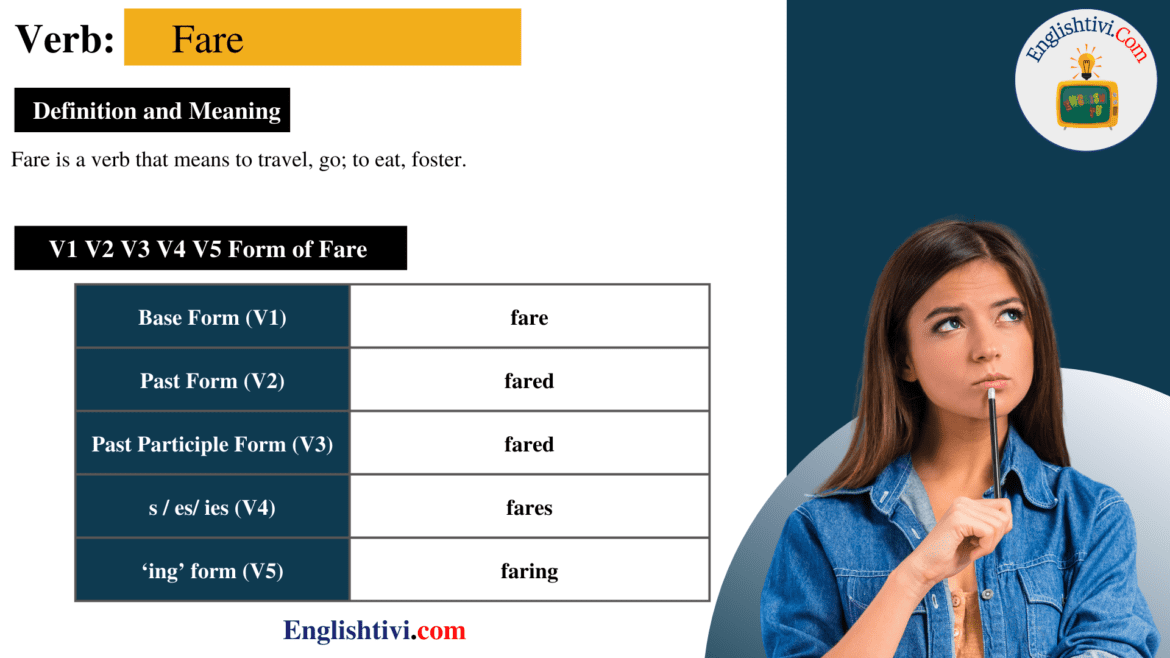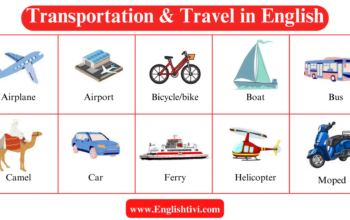Fare V1 V2 V3 V4 V5 is one of the verbs that are used very commonly in English tests as well as in everyday communication. Also, because it’s an irregular verb, fare doesn’t follow the regular rule. The verb “fare” has five different forms: base form, past simple, past participle form, present perfect, and present perfect participle. So what is fare‘s past? How do conjugate verbs with fare verbs?
⏩ Sign Up to Get Bonus
Let’s find out with English tivi in the article below.
See more at: Verbs
Fare of Definition and Meaning
Fare is a verb that means to travel, go; to eat, foster.
V1 V2 V3 V4 V5 Form of Fare
| Base Form (V1) | fare |
| Past Form (V2) | fared |
| Past Participle Form (V3) | fared |
| s / es/ es (V4) | fares |
| ‘ing’ form (V5) | faring |
Fare of Past Simple V2
The verb Fare is also employed in its V2 form as “fared”’. It is used to indicate the past tense in sentences.
Fare of Past Participle V3
The V3 form is identical to the V2 form. The V3 form is “fared”. Fared is used in the past or present perfect tense.
+ In the present perfect tense, we use the word V1 as ‘have + fared‘ or ‘has + fared'.
- I, you, and we are used as ‘have + fared‘.
- ‘has + fared' is used for he, she, and it.
+ If you need to use the past perfect tense, use ‘had + fared‘ regardless of the subject.
You might also like: ALL the English Grammar Basics You Need
Conjugation of Fare V1 V2 V3 V4 V5
Conjugation table: Fare | |||
| Number | Singular | ||
| Present Simple of fare | I | You | She/He/It |
| fare | fare | fares | |
| Plural | |||
| We | You | They | |
| fare | fare | fare | |
| Present Continuous of fare | I | You | She/He/It |
| am faring | are faring | is faring | |
| Plural | |||
| We | You | They | |
| are faring | are faring | are faring | |
| Present Perfect of fare | I | You | She/He/It |
| have fared | have fared | has fared | |
| Plural | |||
| We | You | They | |
| have fared | have fared | have fared | |
| Present Perfect Continuous of fare | I | You | She/He/It |
| have been faring | have been faring | has been faring | |
| Plural | |||
| We | You | They | |
| have been faring | have been faring | have been faring | |
| Past Simple of fare | I | You | She/He/It |
| fared | fared | fared | |
| Plural | |||
| We | You | They | |
| fared | fared | fared | |
| Past Continuous of fare | I | You | She/He/It |
| was faring | were faring | was faring | |
| Plural | |||
| We | You | They | |
| were faring | were faring | were faring | |
| Past Perfect of fare | I | You | She/He/It |
| had fared | had fared | had fared | |
| Plural | |||
| We | You | They | |
| had fared | had fared | had fared | |
| Past Perfect Continuous of fare | I | You | She/He/It |
| had been faring | had been faring | had been faring | |
| Plural | |||
| We | You | They | |
| had been faring | had been faring | had been faring | |
| Future Simple of fare | I | You | She/He/It |
| will/shall fare | will/shall fare | will/shall fare | |
| Plural | |||
| We | You | They | |
| will/shall fare | will/shall fare | will/shall fare | |
| Future Continuous of fare | I | You | She/He/It |
| will/shall be faring | will/shall be faring | will/shall be faring | |
| Plural | |||
| We | You | They | |
| will/shall be faring | will/shall be faring | will/shall be faring | |
| Future Perfect of fare | I | You | She/He/It |
| will/shall have fared | will/shall have fared | will/shall have fared | |
| Plural | |||
| We | You | They | |
| will/shall have fared | will/shall have fared | will/shall have fared | |
| Future Perfect Continuous of fare | I | You | She/He/It |
| will/shall have been faring | will/shall have been faring | will/shall have been faring | |
| Plural | |||
| We | You | They | |
| will/shall have been faring | will/shall have been faring | will/shall have been faring | |
| Conditional Present of fare | I | You | She/He/It |
| would fare | would fare | would fare | |
| Plural | |||
| We | You | They | |
| would fare | would fare | would fare | |
| Conditional Perfect of fare | I | You | She/He/It |
| would have fared | would have fared | would have fared | |
| Plural | |||
| We | You | They | |
| would have fared | would have fared | would have fared | |
| Conditional Present Continuous of fare | I | You | She/He/It |
| would be faring | would be faring | would be faring | |
| Plural | |||
| We | You | They | |
| would be faring | would be faring | would be faring | |
| Conditional Perfect Continuous of fare | I | You | She/He/It |
| would have been faring | would have been faring | would have been faring | |
| Plural | |||
| We | You | They | |
| would have been faring | would have been faring | would have been faring | |
| Present Subjunctive of fare | I | You | She/He/It |
| fare | fare | fare | |
| Plural | |||
| We | You | They | |
| fare | fare | fare | |
| Past Subjunctive of fare | I | You | She/He/It |
| fared | fared | fared | |
| Plural | |||
| We | You | They | |
| fared | fared | fared | |
| Past Perfect Subjunctive of fare | I | You | She/He/It |
| had fared | had fared | had fared | |
| Plural | |||
| We | You | They | |
| had fared | had fared | had fared | |
| Imperative of fare | I | You | She/He/It |
| fare | |||
| Plural | |||
| We | You | They | |
| Let’s fare | fare | ||
See more at: Vocabulary
Example Sentences with Fare V1 V2 V3 V4 V5
In this section, we will learn about fare sentence examples:
- He fared on a trip two days ago.
- Because her daughter is sick, Linda is faring her.
- I will fare with colleagues.
Synonym Words For Fare
Synonym of fare word list. Here are a variety of words whose meaning is nearly the synonym of fare:
- feed
- dine
- victual
- partake
- refresh
- eat
- feast
- peregrinate
- travel
- journey
- voyage
- trek
- tour
- trip
- cruise
Opposite Words For Fare
The antonym of fare word list. Here are some words that have nearly the opposite meaning as fare:
- abstain
- fast
- give
- maintain
- gather
- starve
- stay
- wait
- await
- hang
- hang on
You might also like: Best List of Irregular Verbs in English
Some Frequently Asked Questions About Fare (Verb)
What is the V1 V2 V3 V4 V5 of fare?
The past tense of fare is fared. The third-person singular simple present indicative form of fare is fares. The present participle of fare is faring. The past participle of fare is fared.
| Base Form (V1) | fare |
| Past Form (V2) | fared |
| Past Participle Form (V3) | fared |
| s / es/ es (V4) | fares |
| ‘ing’ form (V5) | faring |
What is the V2 and V3 form of fare?
+ The V2 and V3 form of fare is “fared“.
What is the sentence of fare?
What is the past tense V2 of fare?
+ The past tense of fare is “fared“.
What is the past participle V3 of fare?
+ The past participle of fare is “fared“.
What is the present participle V5 of fare?
+ The present participle of fare is “faring“.
Conclusion
Let’s learn with English TV the structure of the verb “Fare V1 V2 V3 V4 V5“: Base Form, Past Simple, Present Continuous and Present Continuous and Present Continuous and Present Continuous forms. We wish you all the best of luck.
You should subscribe to the English TV YouTube channel if you want to learn more about the English language and improve your proficiency.





